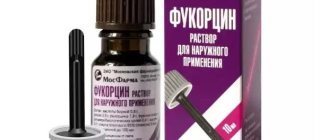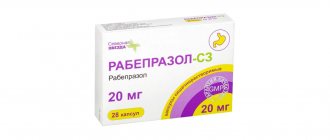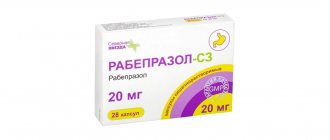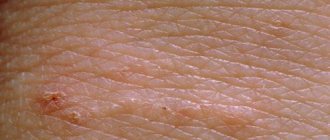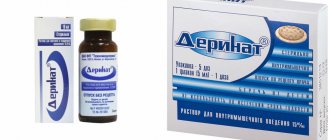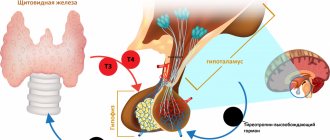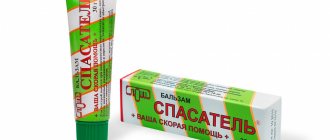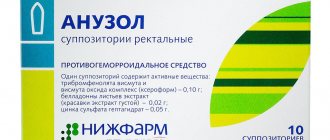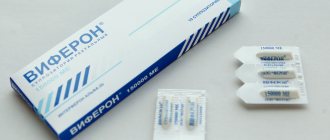pharmachologic effect
L Thyroxine is a substance of thyroid hormones. The active element of the drug has a similar therapeutic effect as the thyroid gland’s own compounds - triiodothyronine and thyroxine. Once in the body, sodium levothyroxine is converted into liothyronine, which has a direct effect on human growth and development, as well as the regulation of metabolism.
It is L Thyroxine that has the ability to influence oxidative metabolism in mitochondria and control the amount of cations inside and outside cells.
The pharmacological effect of the drug is explained by its dose. When taking the drug in a small dosage, anabolic processes occur in the body, and at a high dose, acceleration of oxidative reactions and metabolism is observed, cells and tissues become more demanding of oxygen, and improvement in the functioning of the heart, blood vessels and nervous system is also observed.
The result of therapy when taking the drug can be noticed after 5 days. Over the course of 3-6 months, the symptoms of diffuse goiter are completely suppressed.
The drug is rapidly absorbed after oral administration. Excreted through the kidneys and intestines.
L-Thyroxine Berlin-Chemie Tablets, pack, 50 pcs, 50 mcg, for oral administration
Interaction with other drugs
The use of tricyclic antidepressants with levothyroxine sodium may lead to increased effects of the antidepressants.
Levothyroxine sodium reduces the effect of cardiac glycosides.
When used simultaneously, cholestyramine and colestipol (ion exchange resins) reduce the plasma concentration of levothyroxine sodium by inhibiting its absorption in the intestine. In this regard, levothyroxine sodium must be taken 4-5 hours before taking these drugs.
Colesevelam binds to levothyroxine sodium and thus reduces the absorption of levothyroxine sodium from the gastrointestinal tract. Although no interactions have been observed when levothyroxine sodium was administered at least 4 hours before colesevelam, levothyroxine sodium should be taken at least 4 hours before colesevelam.
When used simultaneously with anabolic steroids, asparaginase, tamoxifen, pharmacokinetic interaction is possible at the level of binding to plasma proteins.
Protease inhibitors (eg, ritonavir, indinavir, lopinavir) may affect the effectiveness of levothyroxine sodium. Close monitoring of thyroid hormone concentrations is recommended. Thyroid-stimulating hormone (TSH) should be monitored in patients taking levothyroxine sodium for at least the first month after starting and/or stopping treatment with ritonavir. If necessary, the dose of levothyroxine sodium should be adjusted.
Phenytoin may affect the effectiveness of levothyroxine sodium due to the displacement of levothyroxine sodium from plasma proteins, which can lead to increased concentrations of free T4 and T3. On the other hand, phenytoin increases the rate of metabolism of levothyroxine sodium in the liver. Close monitoring of thyroid hormone concentrations is recommended.
Levothyroxine sodium may reduce the effectiveness of hypoglycemic drugs. Therefore, frequent monitoring of blood glucose concentrations is necessary from the start of thyroid hormone replacement therapy. If necessary, the dose of the hypoglycemic drug should be adjusted.
Levothyroxine sodium may enhance the effect of anticoagulants (coumarin derivatives) by displacing them from plasma proteins, which may increase the risk of bleeding, such as cerebral hemorrhage or gastrointestinal bleeding, especially in elderly patients. Therefore, regular monitoring of coagulation parameters is necessary both at the beginning and during combination therapy with these drugs. If necessary, the dose of the anticoagulant should be adjusted.
Salicylates, dicumarol, furosemide in high doses (250 mg), clofibrate and other drugs can displace levothyroxine sodium from binding to plasma proteins, which leads to an increase in the concentration of free T4.
Sevelamer and lanthanum carbonate may reduce the absorption of levothyroxine sodium. Tyrosine kinase inhibitors (eg, imatinib, sunitinib) may reduce the effectiveness of levothyroxine sodium. Therefore, at the beginning or end of a course of simultaneous therapy with these drugs, it is recommended to monitor changes in thyroid function in patients. If necessary, the dose of levothyroxine sodium is adjusted.
Aluminum-containing drugs (antacids, sucralfate) are described in the literature as potentially reducing the effectiveness of levothyroxine sodium. Therefore, it is recommended to take levothyroxine sodium at least 2 hours before using these medications. This recommendation also applies to the use of medications containing iron and calcium salts.
Somatropin, when used simultaneously with levothyroxine sodium, can accelerate the closure of epiphyseal growth plates.
Propylthiouracil, glucocorticosteroids, beta-sympatholytics, iodinated contrast agents and amiodarone inhibit the conversion of T4 to T3. Due to the high iodine content, the use of amiodarone may be accompanied by the development of both hyperthyroidism and hypothyroidism. Particular attention should be paid to nodular goiter with the possible development of unrecognized functional autonomy.
Sertraline, chloroquine/proguanil reduce the effectiveness of levothyroxine sodium and increase the concentration of TSH in the blood plasma.
Drugs that induce hepatic enzymes (eg, barbiturates, carbamazepine) may enhance the hepatic clearance of levothyroxine sodium.
In women using estrogen-containing contraceptives or in postmenopausal women receiving hormone replacement therapy, the need for levothyroxine sodium may be increased.
Consumption of soy-containing products may reduce the intestinal absorption of levothyroxine sodium. Therefore, dosage adjustments may be necessary, especially when starting or stopping consumption of soy-containing products.
With simultaneous use of orlistat and levothyroxine sodium, hypothyroidism may develop and/or a decrease in the control of hypothyroidism may occur. The reason for this may be decreased absorption of iodine salts and/or levothyroxine sodium. Patients taking levothyroxine sodium should consult their physician before starting orlistat, as it may be necessary to take orlistat and levothyroxine sodium at different times of the day, and the dose of levothyroxine sodium may need to be adjusted. Further monitoring of thyroid function is recommended.
Indications for Thyroxine
As a rule, Thyroxine is included in the basis of hormonal replacement treatment for decreased thyroid function. In addition, taking the medicine is relevant for the following conditions:
- Hypothyroidism of various origins.
- Excess body weight and pronounced signs of cretinism, provoking the appearance of thyroid hypothyroidism.
- Cerebral-pituitary pathological conditions.
- Prevention of the occurrence of nodular goiter due to surgery on the organ.
- Therapy of diffuse goiter.
- Treatment of malignant tumor of the thyroid gland.
- Graves pathology.
- Euthyroid proliferation of the gland.
L-Thyroxin
The use of tricyclic antidepressants with levothyroxine sodium may lead to increased effects of the antidepressants.
Levothyroxine sodium reduces the effect of cardiac glycosides.
When used simultaneously, cholestyramine and colestipol (ion exchange resins) reduce the plasma concentration of levothyroxine sodium by inhibiting its absorption in the intestine. In this regard, levothyroxine sodium should be used 4-5 hours before taking these drugs.
When used simultaneously with anabolic steroids, asparaginase, tamoxifen, pharmacokinetic interaction is possible at the level of binding to plasma proteins.
Protease inhibitors (eg, ritonavir, indinavir, lopinavir) may affect the effectiveness of levothyroxine sodium. Close monitoring of thyroid hormone concentrations is recommended. If necessary, the dose of levothyroxine sodium should be adjusted.
Phenytoin may affect the effectiveness of levothyroxine sodium due to the displacement of levothyroxine sodium from plasma proteins, which can lead to an increase in the concentration of free T4 and T3. On the other hand, phenytoin increases the rate of metabolism of levothyroxine sodium in the liver. Close monitoring of thyroid hormone concentrations is recommended.
Levothyroxine sodium may reduce the effectiveness of hypoglycemic drugs. Therefore, frequent monitoring of blood glucose concentrations is necessary from the start of thyroid hormone replacement therapy. If necessary, the dose of the hypoglycemic drug should be adjusted.
Levothyroxine sodium may enhance the effect of anticoagulants (coumarin derivatives) by displacing them from plasma proteins, which may increase the risk of bleeding, such as cerebral hemorrhage or gastrointestinal bleeding, especially in elderly patients. Therefore, regular monitoring of coagulation parameters is necessary both at the beginning and during combination therapy with these drugs. If necessary, the dose of the anticoagulant should be adjusted.
Salicylates, dicumarol, furosemide in high doses (250 mg), clofibrate and other drugs can displace levothyroxine sodium from binding to plasma proteins, which leads to an increase in the concentration of the free T4 fraction.
Sevelamer may reduce the absorption of levothyroxine sodium.
Tyrosine kinase inhibitors (eg, imatinib, sunitinib) may reduce the effectiveness of levothyroxine sodium. Therefore, at the beginning or at the end of a course of concomitant therapy with these drugs, it is recommended to monitor changes in thyroid function in patients. If necessary, the dose of levothyroxine sodium is adjusted.
Aluminum-containing drugs (antacids, sucralfate) are described in the literature as potentially reducing the effectiveness of levothyroxine sodium. Therefore, it is recommended to take levothyroxine sodium at least 2 hours before using these medications. This recommendation also applies to the use of medications containing iron and calcium salts.
Somatropin, when used simultaneously with levothyroxine sodium, can accelerate the closure of epiphyseal growth plates.
Propylthiouracil, glucocorticosteroids, beta-sympatholytics, iodine-containing contrast agents and amiodarone inhibit the peripheral conversion of T4 to T3.
Due to the high iodine content, the use of amiodarone may be accompanied by the development of both hyperthyroidism and hypothyroidism. Particular attention should be paid to nodular goiter with the possible development of unrecognized functional autonomy.
Sertraline, chloroquine/proguanil reduce the effectiveness of levothyroxine sodium and increase the concentration of TSH in the blood serum.
Drugs that induce hepatic enzymes (eg, barbiturates, carbamazepine) may enhance the hepatic clearance of levothyroxine sodium.
In women using estrogen-containing contraceptives or in postmenopausal women receiving hormone replacement therapy, the need for levothyroxine sodium may be increased.
Consumption of soy-containing products may reduce the intestinal absorption of levothyroxine sodium. Therefore, dosage adjustments may be necessary, especially when starting or stopping consumption of soy-containing products. With simultaneous use of orlistat and levothyroxine sodium, hypothyroidism may develop and/or a decrease in the control of hypothyroidism may occur. The reason for this may be decreased absorption of iodine salts and/or levothyroxine sodium. Patients taking levothyroxine sodium should consult their physician before starting orlistat as it may be necessary to take orlistat and levothyroxine sodium at different times of the day and the dose of levothyroxine sodium may need to be adjusted. Further monitoring of thyroid function is recommended.
Contraindications
Absolute contraindications to the use of Thyroxine are:
- Acute myocardial infarction.
- Severe inflammatory lesions of the heart.
- Thyrotoxicosis, which has not previously been treated.
- Galactose deficiency.
- Impaired absorption of substances by the intestinal walls.
- Individual intolerance to the active substance.
- Kypocorticism.
It is necessary to take the drug with extreme caution in patients suffering from severe diseases of the heart and blood vessels, diabetes mellitus, and a severe form of hypothyroidism with a prolonged course of the process. In this case, patients need to change the therapeutic dose and duration of the therapeutic course.
Side effects of L Thyroxine
If you take the drug under the vigilant supervision of a doctor and follow all his recommendations, taking the drug does not cause any side effects. Otherwise, symptoms of an allergic reaction are observed - skin rash, hyperemia, itching, urticaria.
Other symptoms occur with a high dose or incorrect treatment tactics. They appear rarely and represent the following conditions:
- Headache, tremors of extremities, anxiety, excitement, sleep disturbance.
- Cardiac disorder - arrhythmia, palpitations, angina pectoris, tachycardia.
- Dyspeptic manifestations.
- Pathological course of menstruation.
- Allergic symptoms.
- Excessive sweating, weight loss, fever, constant weakness, fever.
Hormonal drug Berlin-Chemie AG “L-thyroxine” - reviews
Ekaterina Volokhina
I consider L-thyroxine to be a serious drug that must be prescribed by a doctor. And then, after receiving laboratory data. Unfortunately, it is almost impossible to find a good endocrinologist in a small town. Therefore, I take Tyramine, which has no side effects and gently restores thyroid function. Unfortunately, the drug was not on sale for a long time. Therefore, I had to take a break from treatment. Now production has been resumed, to the delight of everyone who drinks peptides.
marusya1988
https://otzovik.com/review_1992214.html
Advantages:
- helps eliminate excess hormones
- I didn’t feel any side effects
- inexpensive
Flaws:
- did not find
Before, I somehow didn’t suspect that I had any problems with thyroid hormones. In February, my attending physician did not like some of my tests and she told me to donate blood for TSH, I donated and it turned out that I have an excess of this hormone, the norm is up to 4, my analysis showed 5.22, this excess is called hyperthyroidism .
The endocrinologist prescribed me to take L-thyroxine at a dosage of 50 mg. I was prescribed the following dosage: half a tablet for two weeks and starting from the third week a whole tablet should be taken.
Of all the options at the pharmacy, I chose L-thyroxine from the Berlin-Chemie company. I read the reviews before purchasing and thought that this would be better for me.
A package of these tablets costs 100 rubles, I paid 95 rubles for them at a discount. There are a lot of tablets in a pack - 50 pieces.
The L-thyroxine tablet is very small, so when you squeeze it out of the blister, you need to make sure that it does not fall or roll away. But since the packaging of this drug is very convenient, made of soft foil, there are no problems with removing the tablet and it is convenient to put half of the tablet back into the package; it closes very well with foil and does not fall out.
It is convenient to divide the tablet in half, although it is small, it is very well divided in half, you need to place it on a hard surface and press both halves with your fingers, it falls apart very well into two parts.
I always take this pill in the morning, about half an hour to an hour before breakfast. I take it with a glass of water so that the tablet is absorbed faster. L-thyroxine has no taste or smell.
I didn’t feel any side effects from these pills, as they say, my mustache doesn’t grow, I don’t get excessively fat from it, well, naturally I gain weight, but only that which is supposed to be gained during pregnancy.
As for the effect, this drug helped me reduce the concentration of thyroid-stimulating hormone, now I have less than 4 units, which is the norm, but I will still have to take the drug until the end of pregnancy, since it is unknown what can happen after discontinuation, doctors do not recommend canceling it. And after the birth you will already see what happens next, maybe everything will be settled by itself.
Helen09
https://otzovik.com/review_3127927.html
Attention!
Before using medications, consult a specialist!
Advantages:
- Active!
Flaws:
- 30 minutes before meals, quite uncomfortable in the morning.
A year ago I saw a poster talking about hypothyroidism, and literally all the symptoms suited me! I remembered this a year later, when I really began to suffer from weight stagnation, when only total fasting helped to lose 1-2 kg, and which returned with lightning speed, from constant cold, fatigue, drowsiness, irritability. I sounded the alarm, got tested, T4 was as much as 23! But all other indicators were normal, and all this pointed to hypothyroidism.
I sounded the alarm, made an appointment with an endocrinologist, as I thought, he prescribed me thyroxine. Now I’ve been taking thyroxine from Berlin Hemi for 20 days, I’m literally losing weight before my eyes with a normal diet, I’ve stopped feeling so cold and sleeping on the go! I definitely recommend it, as prescribed by your doctor.
Faber
https://irecommend.ru/content/uskoryaet-obmennye-protsessy
I took thyroxine to lose weight. I realized that I was doing the wrong thing, since this drug can only be prescribed by an endocrinologist based on the results of analyzes of thyroid hormones, TSH, etc. To be honest, I did not get the desired effect. I haven't lost a single kilogram from thyroxine. The weight remained the same. Of its effects, I liked the increase in performance and mood. But this is the only positive action. The negative is that I had terrible constipation (which is not typical for thyroxine), as a result of which a hemorrhoid appeared. And my face and back were covered with terrible acne. There was a constant oily film on my face. I had to wash my face several times a day. After finishing taking thyroxine, I did not gain weight and that’s good. Acne goes away, constipation too.
Advantages:
- compensates for the deficiency of the hormone T4 in the body
- speeds up metabolism
Hillenyagin
https://otzyv.expert/podderzhivaet-rabotu-shitovidnoy-zhelezi-2000587
Advantages:
- helps
Flaws:
- side effects
- take 30 minutes before before breakfast
- price
Details
The hormonal drug L-thyroxine was prescribed to my mother-in-law after surgery on the thyroid gland. At first, my mother-in-law tried to replace it with a domestic analogue, but her body did not accept it. You have to spend money on more expensive L-thyroxine, which is produced by Berlin-Chemie. The mother-in-law regularly visits the endocrinologist, but L-thyroxine is not canceled for her and, most likely, she will have to take it for life.
There are 50 tablets in a package.
They are small and easy to swallow.
Trouble No. 1 is that the tablet must be taken in the morning on an empty stomach at least 30 minutes before. before breakfast. The mother-in-law is already more or less used to it, but it will be difficult for those who are used to starting the day with a meal.
Trouble No. 2 is a side effect, and more specifically, disorders, as people say. For this reason, the mother-in-law, as a rule, does not have breakfast if she needs to go somewhere. Fortunately, stomach upsets do not happen every time after taking the drug, but quite often. There were no other side effects after L-thyroxine.
I won’t indicate the cost at the end of the review, since it constantly fluctuates. The tablets are not budget-friendly, especially for a pensioner, but there is no other choice.
Nastya
https://med-otzyv.ru/lekarstva/154-l/26010-l-tiroksin-50-berlin-hemi
I am 29 years old. Diagnosis of congenital hypothyroidism. I have been taking L thyroxine for 29 years, that is, since birth. I live a full life. I graduated from college and gave birth to a completely healthy child, by the way. Yes, of course, sometimes there are mood swings, well, my hair is falling out, my nails are brittle, but my weight is always normal. I didn't experience any side effects.
Ulyana
https://med-otzyv.ru/lekarstva/154-l/26010-l-tiroksin-50-berlin-hemi
After prescribing this drug, I couldn’t decide for almost a month whether I would take it or not. I read a bunch of negative reviews. But the symptoms accompanying hypothyroidism were tormented, I decided to take it for a few days, and if something goes wrong, stop taking it. Now I regret that I didn’t start drinking right away. My mood is good, my insomnia and anxiety have disappeared. My head began to think clearly and quickly, I feel like I’m returning to my old self. The increased appetite that the doctor warned about did not appear. I feel a surge of strength, I want to move mountains.
Maria Khramluk
https://flap.rf/Medicine/l-thyroxine
I also found out about my thyroid problems quite by accident. I lived my whole life and didn’t expect it, and when I became pregnant with my second and didn’t gain weight at all, although I should have been a little bit at a time, sometimes I lost all weight, there was no toxicosis, I didn’t even eat for two, but for three or four . In general, my attending physician, after listening to all this, gave me a referral for a blood test for TSH (thyroid-stimulating hormone), I went and took it and it turned out that I had an excess of this hormone.
It was because of this that I had weakness, fatigue, headaches, the endocrinologist said that it was not necessarily that hyperthyroidism could have been there before, perhaps it was provoked by pregnancy, plus nerves, and I was very nervous, I immediately realized that I admitted it because unfortunately there was a reason, all this together gave rise to hyperthyroidism.
Therefore, I was recommended to take L-thyroxine at a dosage of 50 mg; for two weeks I had to drink a whole tablet, and then half. After two months of treatment, I took the test again, it showed that the hormone is normal, but now I need to monitor it, I will periodically donate blood.
The tablets are small, they are convenient to take, breaking them in half is also convenient, just try not to drop them, because then you won’t find them in half))) They are tasteless. And the fact that they had to be taken 30 minutes before breakfast was not a problem for me, I took the pill, washed it down with a glass of water, the doctor also advised that it would be better absorbed and I went to take my son to kindergarten while I was taking him, 30 minutes passed, then she had breakfast.
I didn't feel any side effects. But the improvement was noticeable, I stopped sleeping everywhere and always, before treatment I slept all day long, although in general the pregnancy was easy. And then at least some vitality woke up.
Instructions for use of L Thyroxine
According to the instructions, the drug should be taken on an empty stomach half an hour to an hour before meals, washed down with small amounts of still water. It is recommended not to chew the tablets. The therapeutic dose and course duration are determined by a specialist depending on the clinical indications.
As a replacement treatment, the drug is prescribed to patients under 55 years of age who do not have problems with the cardiovascular system at a dose of 1.6-1.8 mcg/kg. If there are any diseases and the patient is over 55 years old, the therapeutic dosage is halved.
For the treatment of congenital hypothyroidism, the dose of the drug is calculated taking into account the weight and age of the patient. The drug can be prescribed to children from the first days of life. As a rule, for such a condition, Thyroxine tablets are used for life.
For the treatment of thyrotoxicosis, the drug is simultaneously combined with antithyroid drugs after achieving the euthyroid process.
Instructions for use L-THYROXIN 100 BERLIN-CHEMIE (L-THYROXIN 100 BERLIN-CHEMIE)
Cholestyramine and colestipol inhibit the absorption of levothyroxine, so they should be taken no earlier than 4 - 5 hours after taking L-Thyroxine 50 Berlin-Chemie.
Absorption of levothyroxine may be reduced by concomitant use of aluminum-containing antacids that bind stomach acid, calcium carbonate and iron-containing drugs. Therefore, L-Thyroxine 50 Berlin-Chemie should be taken at least two hours before taking these drugs.
Sevelamer may reduce the bioavailability of levothyroxine. Therefore, L-Thyroxine 50 Berlin-Chemie should be taken at least 1-3 hours before taking sevelamer.
Propylthiouracil, glucocorticoids, β-blockers, and radiocontrast agents containing iodine inhibit the conversion of T4 to T3.
Due to its high iodine content, amiodarone can cause both hyperthyroidism and hypothyroidism. Particular attention should be paid in the case of nodular goiter with possible undiagnosed functional autonomy of the thyroid gland.
Rapid intravenous administration of phenytoin can lead to increased levels of free levothyroxine in the blood plasma and, in some cases, alleviate the development of arrhythmia.
Salicylates, dicoumarol, high doses of furosemide (250 mg), clofibrate and other substances may displace levothyroxine from plasma protein binding sites and thus lead to an increase in plasma free levothyroxine levels.
Sertraline and chloroquine/proguanil reduce the effectiveness of levothyroxine and increase serum TSH levels.
Barbiturates and other drugs with enzyme-inducing effects on the liver may increase the hepatic clearance of levothyroxine.
The need for levothyroxine may be increased during the period of taking estrogen-containing contraceptives or during hormone replacement therapy in the postmenopausal period.
Products containing soy may impair the absorption of L-Thyroxine 50 Berlin-Chemie in the intestine. At the beginning and especially at the end of the use of a soy-containing diet, adjustment of the dose of L-Thyroxine 50 Berlin-Chemie may be necessary.
Levothyroxine may weaken the hypoglycemic effect of antidiabetic drugs. Therefore, mainly at the beginning of thyroid hormone therapy in diabetics, regular monitoring of blood glucose levels is necessary. The dose of the antidiabetic drug may need to be adjusted.
Levothyroxine may enhance the effect of coumarin derivatives by displacing them from sites of binding to plasma proteins. Therefore, during concomitant treatment, regular monitoring of blood clotting parameters is required and the dose of the anticoagulant may need to be adjusted.
